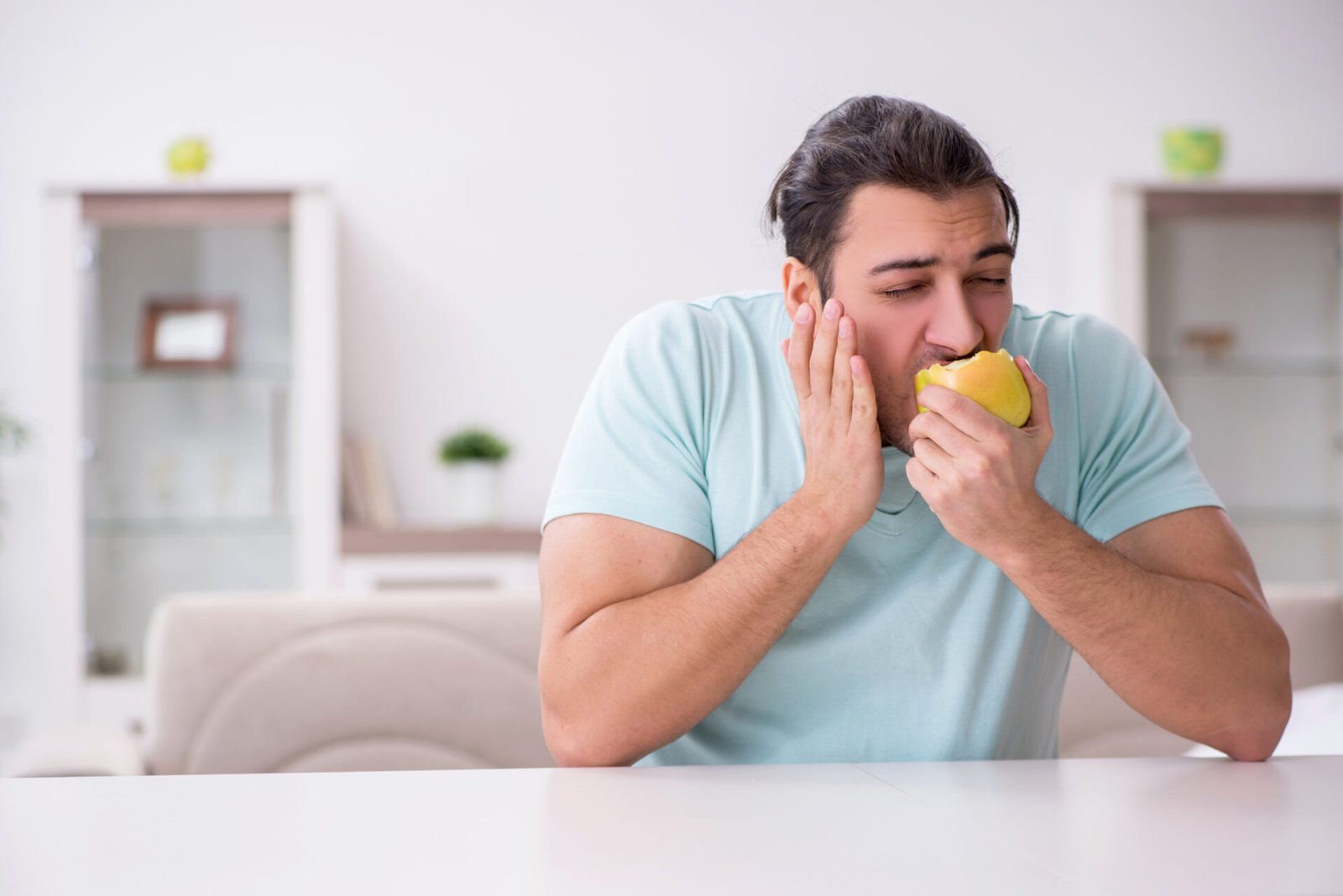Have you ever wondered, “why does my jaw pop when I chew?” Maybe you hear a clicking noise every time you eat crunchy food, or your jaw feels stiff when you open wide. For some, this sound is nothing more than a harmless quirk. For others, it’s a warning sign of an underlying issue like TMJ disorder, teeth grinding, arthritis, or bite misalignment.
Jaw popping is common, but it’s not something you should always ignore. To understand when it’s safe and when it’s serious, let’s break down the causes, risks, and practical ways to stop it.
What Does Jaw Popping Mean?
Your jaw’s movement depends on the temporomandibular joint (TMJ). This joint acts like a hinge, connecting your jawbone to the skull while allowing smooth motion for chewing, yawning, and speaking.
When you hear a clicking or popping noise, it usually means the joint isn’t moving as smoothly as it should. Sometimes it’s caused by a slight shift in position. Other times, it’s due to tension, inflammation, or structural problems.
To simplify, imagine your jaw joint like a door hinge:
- If the hinge works properly, the door opens silently.
- If the hinge is misaligned or rusty, it creaks every time you use it.
That creaking is exactly what’s happening inside your jaw when it pops.
Why Does My Jaw Pop When I Chew? The Main Causes
Several medical conditions, habits, and lifestyle factors explain why your jaw pops when you chew. Let’s explore them in detail.
1. Temporomandibular Joint Disorder (TMJ/TMD)
TMJ disorder occurs when the jaw joint is damaged, strained, or misaligned. It’s one of the most common reasons behind jaw popping.
Symptoms of TMJ disorder include:
- Jaw pain or tenderness
- Popping and clicking during chewing or yawning
- Earaches, headaches, or neck pain
- Difficulty opening or closing the mouth fully
Case Study:
A 28-year-old office worker developed jaw popping after months of chewing gum during stressful workdays. Over time, the popping worsened, and she began experiencing headaches. A dentist diagnosed her with TMJ disorder caused by constant joint strain. With a mouthguard and lifestyle changes, her popping and pain improved in weeks.
2. Bruxism (Teeth Grinding and Clenching)
Bruxism, often linked to stress or anxiety, is another leading cause. Grinding at night or clenching during the day places extreme pressure on the jaw joint, leading to popping and soreness.
Signs of bruxism:
- Flattened or chipped teeth
- Jaw fatigue upon waking
- Increased tooth sensitivity
- Audible grinding noises at night
Statistic: According to the Sleep Foundation, nearly 10% of adults grind their teeth at night, with higher prevalence among people with high stress levels.
Left untreated, bruxism can not only worsen jaw popping but also cause tooth damage and chronic pain.
3. Arthritis in the Jaw
Both osteoarthritis and rheumatoid arthritis can affect the TMJ.
- Osteoarthritis: Wear-and-tear damages the joint’s cartilage, making movement rough and noisy.
- Rheumatoid arthritis: An autoimmune condition that inflames the joint lining, causing pain and stiffness.
People with arthritis often describe their jaw as “crackling like gravel” when chewing. This condition needs medical management to prevent long-term damage.
4. Misaligned Bite (Malocclusion)
When teeth don’t line up properly, your jaw has to work harder to chew. The uneven pressure can create strain, leading to jaw popping.
Types of misalignment that contribute:
- Overbite or underbite
- Crossbite
- Crowded or crooked teeth
Orthodontic treatment, like braces or aligners, can correct the bite and reduce popping.
5. Everyday Habits and Lifestyle Choices
Sometimes the answer to “why does my jaw pop when I chew” lies in daily habits.
Common culprits include:
- Excessive gum chewing
- Biting nails or chewing on pens
- Frequently eating hard or chewy foods like steak, nuts, or ice
These repetitive actions fatigue the jaw muscles and stress the joint over time.
Is Jaw Popping Dangerous?
Not every case of jaw popping is serious. Many people experience harmless clicking without pain or long-term consequences. Still, it’s crucial to know the red flags that mean you should seek help.
When to worry about jaw popping:
- Persistent or worsening jaw pain
- Locking of the jaw (getting stuck open or closed)
- Facial swelling or stiffness
- Recurring headaches or earaches
- Difficulty chewing or speaking
Ignoring these symptoms may lead to chronic TMJ disorder, joint degeneration, or dental complications.
How to Stop Jaw Popping When Chewing
You don’t have to live with constant popping. Depending on the cause, several remedies can help restore normal movement.
At-Home Remedies
- Apply warm compresses: Heat relaxes tight muscles.
- Do gentle jaw stretches: Small movements improve mobility.
- Eat softer foods temporarily: Reduce strain on the joint.
- Maintain good posture: Poor posture affects jaw alignment.
Medical Treatments
| Treatment Option | How It Helps |
| Dental Splints/Mouthguards | Protect teeth from grinding and reduce stress on the joint |
| Physical Therapy | Strengthens muscles and teaches relaxation techniques |
| Medications | NSAIDs for pain, muscle relaxants for jaw tension |
| Botox Injections | Temporarily relax overactive jaw muscles |
| Surgery (rare cases) | Corrects structural problems when all else fails |
Lifestyle Adjustments
Your habits play a big role in jaw health.
- Manage stress: Try yoga, meditation, or journaling.
- Cut back on gum: Save your joint from overuse.
- Limit hard foods: Avoid constant strain on the jaw.
- Improve sleep hygiene: Helps reduce nighttime clenching.
Prevention Tips for a Healthy Jaw
Preventive care is always better than treatment. Here’s how you can avoid future popping:
- Sit upright at your desk to prevent misalignment
- Avoid clenching your jaw during stressful moments
- Use relaxation techniques like progressive muscle relaxation
- Stay hydrated to support joint cartilage health
- Visit your dentist regularly to catch early issues
Jaw Popping and Stress: A Hidden Connection
Stress is a silent driver behind many jaw issues. When you’re anxious, you’re more likely to clench your teeth or grind at night. This creates extra wear on the TMJ.
Example: Many college students report jaw popping during exam season. After stress levels drop, their symptoms often improve.
This shows that mental health and jaw health are closely linked. Managing one often helps the other.
Real-Life Case Example
Case: John, 35
John noticed his jaw popped every time he ate tough foods. At first, he ignored it. Months later, the popping grew louder, and chewing became painful. After visiting a dentist, he was diagnosed with mild TMJ disorder caused by clenching at work.
His treatment plan:
- Wearing a custom night guard
- Practicing stress management techniques
- Reducing gum chewing
Within three months, his jaw popping decreased dramatically, and his pain disappeared
Final Thoughts
So, why does my jaw pop when I chew? The answer varies. Sometimes it’s nothing more than a harmless sound. Other times it’s a sign of TMJ disorder, teeth grinding, arthritis, or bite misalignment.
The key is to listen to your body. If the popping comes with pain, swelling, or restricted movement, don’t wait. Early care can prevent long-term problems.
By combining at-home remedies, professional treatment, and smart lifestyle changes, you can protect your jaw and restore comfort.

